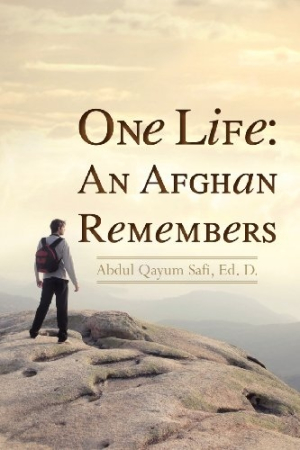One Life: An Afghan Remembers
Safi writes with eloquence and sophistication about a country that is striving to survive under the strictures of fundamentalism and ancient tribal enmities.
One Life: An Afghan Remembers is a fascinating memoir, not only for its detailed descriptions of the author’s remarkable journey and homeland, but also because it offers insight into the history, culture, religion, education, and language that help to explain why contemporary Afghanistan is so complex.
Abdul Qayum Safi, a naturalized US citizen, grew up in abject poverty in a Pashtun area of rural Afghanistan. At roughly age twelve, he traveled alone to Kabul to attend boarding school. Ultimately, Safi earned a bachelor’s degree from the American University of Beirut and a doctorate in education from Columbia University. His jobs have included educator, academic, real estate agent, investor, dried fruit vendor, and interpreter. A Muslim, Safi lives in Virginia with his wife of thirty-four years, who is American and Catholic.
Although English is his fourth language (in addition to Pashto, Dari, and Arabic), Safi writes with an eloquence and sophistication rare even for native English speakers. “Survival,” he says, “is the ultimate reward for a person who has managed to overcome the difficulties in his life by setting himself a goal and summoning the will to attain it, despite the tribulations that came in his way.”
The author’s recollections are remarkably detailed, providing precise locations and even specific dimensions of residences, workplaces, and schools. However, the organization of his memories is sometimes weak. In the chapter devoted to his preschool years, for instance, Safi inserts a description of a trip abroad he took as an adult.
Redundancies also exist, with essentially the same tales appearing more than once. Extensive listings of towns and regions in rural Afghanistan can sometimes be overwhelming, and casual references to dozens of relatives and acquaintances can be confusing.
Nonetheless, anyone interested in learning more about a country with a complex history that is striving to survive under the strictures of religious fundamentalism and ancient tribal enmities will be richly rewarded. The lessons Safi provides on history, politics, culture, language, and religion are eye-opening, and his personal recollections of life in both rural and urban Afghanistan are instructive.
The concluding chapter offers reflections on the current status of the author’s country of origin, as well as thoughts on how to resolve a number of thorny Afghani problems—governance, unequal treatment of women, the place of religion in society, and adoption of a national language.
In One Life, Abdul Qayum Safi demonstrates that he is able to think big and act pragmatically. His story of survival serves as a poignant reminder that, if required, we can endure more than we should have to, and emerge stronger for having done so.
Reviewed by
Nancy Walker
Disclosure: This article is not an endorsement, but a review. The publisher of this book provided free copies of the book and paid a small fee to have their book reviewed by a professional reviewer. Foreword Reviews and Clarion Reviews make no guarantee that the publisher will receive a positive review. Foreword Magazine, Inc. is disclosing this in accordance with the Federal Trade Commission’s 16 CFR, Part 255.

